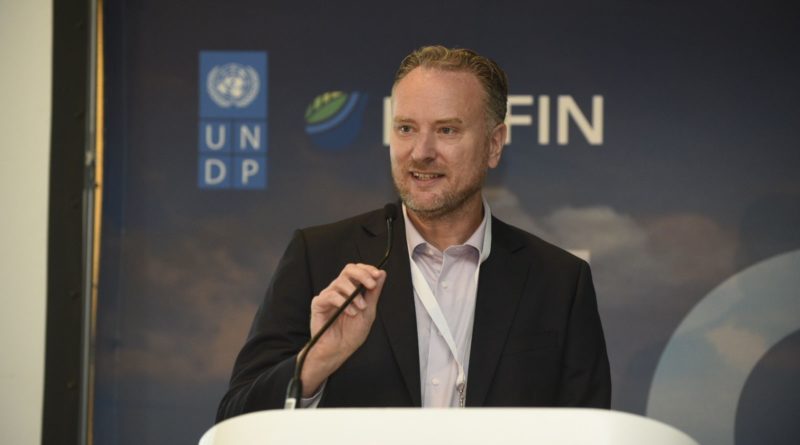5th Global Biodiversity Finance Conference in Cape Town Highlights New Opportunities to Finance Conservation
Planet Earth needs approximately USD950 billion per year to restore and protect imperiled ecosystems necessary to people’s livelihoods, according to a 2020 study by the Nature Conservancy, Paulson Institute and Cornell University. However, only USD121 billion is spent on average per year to conserve biodiversity. To bridge this gap, the United Nations Development Programme’s Biodiversity Finance Initiative (UNDP-BIOFIN) convened over 180 biodiversity finance experts and government members for the 5th Global Conference on Biodiversity Finance.
Held in Cape Town, South Africa, the fifth edition of the conference ran from 9 to 11 May 2023 and covered a broad spectrum of opportunities to finance biodiversity such as finance sector engagement, positive incentives, impact investment, repurposing harmful subsidies and community engagement. Delegates from over 45 countries including the Philippines shared their respective insights and experiences to inspire more action to conserve life and nature in every corner of the globe.
“We’re honored to share our hard-learned strategies on finance and conservation,” said Nokutula Mhene of BIOFIN South Africa. Launched in 2015, BIOFIN’s South Africa Programme promotes seven finance solutions to address ecosystem restoration, protected area management and sustainable biodiversity use.
Globally renowned for wildlife reserves like Kruger National Park and Table Mountain, South Africa is the world’s third most biodiverse nation, hosting nearly 100,000 known species of plants and animals – ranging from the enormous African Bush Elephant (Loxodonta africana) to the tiny Cape Elephant Shrew (Elephantulus edwardii).
“South Africa features some of the continent’s best-known parks, but it is also a biodiversity hotspot with its own challenges. Water scarcity, loss of biodiversity through unsustainable economic practices, poaching and even the lack of adequate financing for protected areas expansion are issues we are tackling head-on. Through creative but practical finance solutions, we hope to help the country meet the Kunming-Montreal Global Biodiversity Framework targets and all biodiversity-related UN SDGs,” added UNDP South Africa Resident Representative Dr. Ayodele Odusola.
Changing Conservation Through Biodiversity Finance
Launched in 2012, BIOFIN is a global initiative supporting the development and implementation of national Biodiversity Finance Plans to transform how biodiversity finance is mobilized and allocated. The world’s primary global conservation agreement, the Kunming-Montreal agreement, was adopted in December in Montreal and includes 23 targets to be met by 2030.
These include the repurposing of subsidies that harm biodiversity by at least USD500 billion yearly, the mobilization of USD200 billion in annual domestic and international biodiversity-related funding from public and private-sector sources, plus raising international financial flows from developed to developing countries by at least USD30 billion yearly.
“This is where BIOFIN comes in,” explained BIOFIN Global Manager Onno van den Heuvel. “We help local communities, civil society, national parks, private entities and government organizations to secure the financing they require to meet their biodiversity objectives on the ground.”
Over the past 11 years, BIOFIN has developed a 41-nation network covering biodiversity-rich regions across Africa, Europe, South and Central America, plus the Asia-Pacific Region. “We continuously refine our strategies, mechanisms and methodologies through national, regional and global learning exchanges such as the 5th Global Conference in Cape Town,” added van den Heuvel.
In South Africa, BIOFIN successfully enhanced investments into businesses that conserve nature by establishing a government-owned Biodiversity Investment platform while offering technical assistance to improve business proposals and facilitate negotiations with investors.
UN Resident Coordinator of South Africa Nelson Muffuh in his goodwill message at the conference opening emphasized the urgent need for actions from all sides – government and the private sector – and to share the responsibility to conserve biodiversity and close the gap for nature financing. UNDP South Africa is extensively working to address this and ensure the inclusion of communities and academia.
Minister of Forestry, Fisheries and Environment of South Africa Barbara Creecy encouraged participants and experts at the 5th Global Conference on Biodiversity Finance to think and keep in mind three critical factors to narrow the financing gap: the link between biodiversity and climate financing and how these can flow from both sides, opportunities to repurpose harmful subsidies in agriculture and other sectors, plus the need for a significant reform of global financial systems.
“Let this not be the third time that we do not meet the global conservation targets. BIOFIN can be the engine that can deliver, if we get it right,” said UNEP Executive Director Inger Andersen during her opening message. She encouraged governments to look at their policies on nature financing, engage the banking and private sectors and think about effective means of implementation. “We know that biodiversity is important. It defines our identity as humans. But policies matter and matter greatly – and this is what BIOFIN can help enable,” added Andersen.
In the Philippines, BIOFIN raised over USD10 million for 107 Legislated Protected Areas by pushing for increased congressional financing. Over USD300,000 was raised for terrestrial reforestation through the Mynt and GCash GForest Programme. Its ongoing Year of the Protected Areas campaign aims to convince Filipinos to responsibly visit the country’s 247 protected areas in the wake of flagging attendance spurred by the COVID-19 pandemic.“We must integrate biodiversity into mainstream finance mechanisms to ensure that line agencies such as the Department of Environment and Natural Resources (DENR), Bureau of Fisheries (BFAR) and our National Parks System can access funds when they need it the most,” concluded Philippine DENR Assistant Secretary Marcial Amaro Jr., who headed the Philippine delegation. “Creative fundraising, particularly from the private sector, can help restore our biodiversity and jumpstart responsible tourism, especially after the pandemic.”




